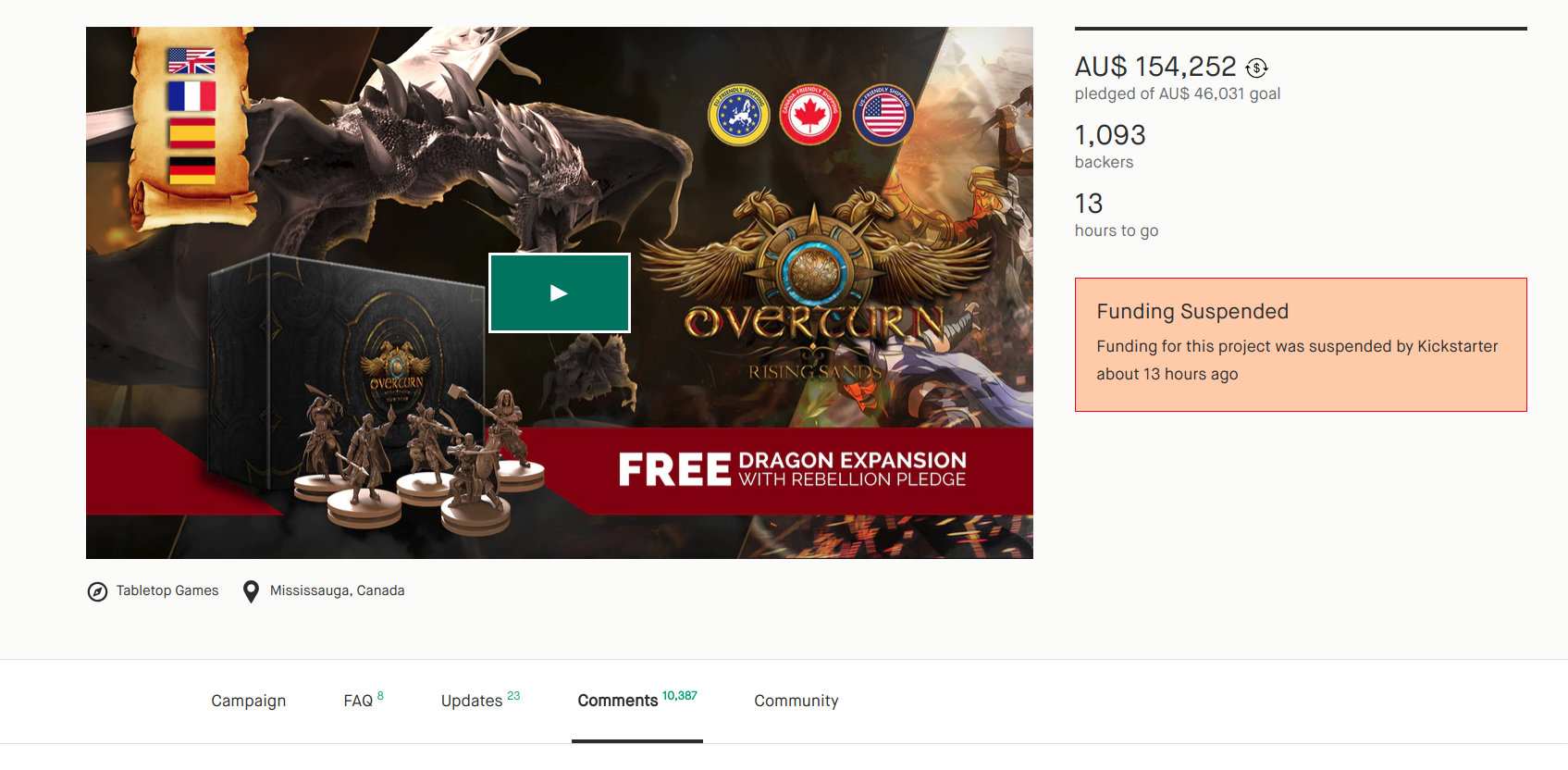 In the last few weeks there have been some issues noted with Kickstarter and scams on the website, especially with the Overturn: Rising Sands saga. In seeing this, we wanted to look at some of the ways in which you can avoid a Kickstarter that is unlikely to fulfil, poorly thought out, or just a scam.
In the last few weeks there have been some issues noted with Kickstarter and scams on the website, especially with the Overturn: Rising Sands saga. In seeing this, we wanted to look at some of the ways in which you can avoid a Kickstarter that is unlikely to fulfil, poorly thought out, or just a scam.
Team and Experience
There are plenty of teams out there who have released a first game on Kickstarter for it to be a wild success, but there are also plenty that have fallen flat. Look for a few things:
- If you follow Facebook groups, have you seen the publisher/developer/designer in the groups and interacting?
- On Boardgamegeek does the company, developer or artist have a page or listing?
- Are there links to legitimate Facebook/LinkedIn/Twitter pages where they are actively exhibiting their product?
If it is a company:
- Do they have a Facebook page;
- Does their website look professional, outline their company history and the people involved?
Also, check the individual profiles of the people who have the game on KS, are they backers of other projects? You want to see that they are engaged with the KS community, that they know how they work and that they are passionate about the industry. Backing other projects is just one more way of knowing that you are dealing with people who know how the process will work.
Prototypes
Is there a prototype (or several) of the game that are in the hands of various people (reviewers etc)? Pictures of a prototype being used at conventions, board game nights etc are all good indicators of the publishers intent. It doesn’t matter if the prototype cards are sleeved pieces of paper with no art, or that the miniatures are 3D printed from someone’s home printer, what matters is the publisher is putting the project out there and saying ‘I am willing to have this critiqued and seen by others’
A rulebook is also a bare minimum. Backers don’t care if it isn’t laid out and written up beautifully like a CMON project, they care whether they can see a whether or not there is a good feel to the game through being able to look at the mechanics and seeing that the designer has actually thought about this project more than ‘Hey, a Kickstarter project would be cool, people like games right?’
Postage and Fulfilment
You want to know that a company has thought the whole process through, from start to finish, and one of the big indicators is knowing how your game will get to you. Solomon Kane was almost $80 to ship to Australia, but I knew that from the start, but imagine finding that out well after your payment for the game had been processed?
You also want to know that the company has a plan to fulfil in different countries, are they at least vaguely aware of how shipping will work to get to you? Are they able to say whether it will include extra duties? Do they have a general timeline of how things will play out after the campaign has ended and, barring any big mix ups, know when people will get the game to their door (usually a month window)
Free postage on a big box game? Forget it. No talk of who is doing the fulfilment, printing, sculpting? Forget it.
Cost
There are very few companies who are able to offer prices below what you would expect to pay for a similar product in stores. One example of this is Riot Games for Mechs and Minions, which is an exception to the rule. Riot is a massive company and can afford to have some short fall, Bleeding Stone Ltd run by a single person from a garage cannot afford to give you a game for cheaper than cost. Remember too that Kickstarters are not to the economy of scale that they will receive bulk discounts from most printers, so therefore you may end up paying more than what you expected for a similar game.
Comments
For Overturn, the big factor in identifying it’s faults were in the Comments section of the Kickstarter where wary backers were constantly spamming (but in a good way) the issues with the project. The comments is the best place to find updates about what is happening with the project and understand how others are feeling about it. This is the place to go, after deciding you like the game, before you hit that ‘Back this Project’ button.
The comments section can outline some issues with the game, where they may have gone wrong, but it also a great place to see how the Creator works with their backers. Are they responding to comments (even just a ‘Thanks’), or do they seem rude or dismissive? All of these things help to identify a quality project and the people behind it.
Updates
This one is particularly important if things start to go wrong. If there is prevailing ill will in the comments section, or elsewhere, then you want the company to come out and say it straight away. They made a dumb mistake with the rulebook? Admit it. If there are other issues, you want to see that they are addressing this through updates to the backers. Taking your time to draft a response that will make everyone happy is fine, but too much silence looks a lot like a cash grab.
Reviews and Previews
This is one of the most important factors in the potential success of a Kickstarter as it shows a commitment to the industry as a whole. Sending out preview copies, play testing at conventions and having written/video reviews prior to the Kickstarter. It doesn’t matter who is doing the reviewing, just the fact that the publisher is sending out copies is the most important thing. If previews are shot by the developer only, or are written reviews by some random guy named ‘Steve’ – avoid it. If the only people that the campaign owner has tested their game on is their family and friends, do you really want to be the next guinea pig? Designing a game that is fun or captivating is hard work and it needs the benefit of critique to make it the best it possibly can be.
Just a note though that all Kickstarters are different and it is important to look at all of the above factors together. If the prototype isn’t strong, but everything else is fine, then that may indicate something in early development. But if there are numerous of the above factors raising flags then I would be looking at opting out.
Anything that you think that I have missed that would indicate a product that is not ready, or problematic from the start?




